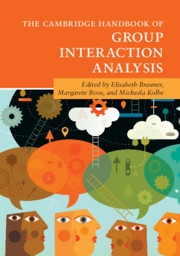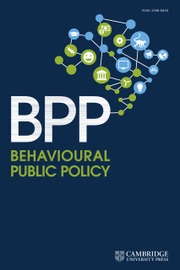The Cambridge Handbook of Group Interaction Analysis
£58.99
Part of Cambridge Handbooks in Psychology
- Editors:
- Elisabeth Brauner, Brooklyn College, City University of New York
- Margarete Boos, University of Göttingen
- Michaela Kolbe, ETH Zürich
- Date Published: August 2018
- availability: Available
- format: Paperback
- isbn: 9781107533875
£
58.99
Paperback
Other available formats:
Hardback, eBook
Looking for an inspection copy?
This title is not currently available on inspection
-
This Handbook provides a compendium of research methods that are essential for studying interaction and communication across the behavioral sciences. Focusing on coding of verbal and nonverbal behavior and interaction, the Handbook is organized into five parts. Part I provides an introduction and historic overview of the field. Part II presents areas in which interaction analysis is used, such as relationship research, group research, and nonverbal research. Part III focuses on development, validation, and concrete application of interaction coding schemes. Part IV presents relevant data analysis methods and statistics. Part V contains systematic descriptions of established and novel coding schemes, which allows quick comparison across instruments. Researchers can apply this methodology to their own interaction data and learn how to evaluate and select coding schemes and conduct interaction analysis. This is an essential reference for all who study communication in teams and groups.
Read more- Combines the expertise of 76 leading researchers with rich theoretical and practical knowledge
- The book is applicable to different areas across many disciplines of the behavioral sciences, including psychology, management studies, communication, and education
- Presents a unique collection of coding schemes developed to study various constructs relevant to interaction research
Reviews & endorsements
'The Cambridge Handbook of Group Interaction Analysis is an essential compendium that thoroughly covers this increasingly important team dynamics research methodology. Whether you are a novice or a seasoned expert, there are nuggets of wisdom in this collection written by a broad collection of experts. If you study team process dynamics, you need this book on your shelf.' Steve W. J. Kozlowski, Michigan State University
See more reviews'This superb handbook offers a compelling case for the benefits of interaction analysis. Stellar contributors from numerous disciplines clearly and comprehensively explicate the methods and analytic techniques of interaction analysis, review established coding schemes, and discuss interpenetration with theory. A 'must have' resource for established scholars in the area and for newcomers.' David R. Seibold, University of California, Santa Barbara
'Brauner, Boos, and Kolbe have assembled a multidisciplinary group of experts, setting the stage for creation of a truly interdisciplinary scholarship of interaction analysis. They've produced a volume rich in methods and theory, yet steeped in the deep history of interaction analysis. Building from a strong evidentiary base, and accessible to a wide variety of stakeholders, this volume will serve as an indispensable guide for years to come and help accelerate our understanding of interactions in their many forms and how they contribute to social, cognitive, and emotional outcomes.' Stephen M. Fiore, University of Central Florida, Past-president of the Interdisciplinary Network for Group Research (INGRoup)
Customer reviews
Not yet reviewed
Be the first to review
Review was not posted due to profanity
×Product details
- Date Published: August 2018
- format: Paperback
- isbn: 9781107533875
- length: 694 pages
- dimensions: 247 x 175 x 33 mm
- weight: 1.38kg
- contains: 73 b/w illus.
- availability: Available
Table of Contents
Part I. Background and Theory:
1. Interaction analysis: an introduction
2. History of group interaction research
Part II. Application Areas of Interaction Analysis:
3. Dyadic interaction analysis
4. Observing group interaction: the benefits of taking group dynamics seriously
5. Unpacking the structures of team interaction patterns
6. Coding nonverbal behavior
7. Behavioral coding in animals
8. Beyond coding interaction: new horizons in interaction analysis
Part III. Methodology and Procedures of Interaction Analysis:
9. Coding interaction: a technical introduction
10. Rules for coding scheme development
11. Unitizing verbal interaction data for coding: rules and reliability
12. Quality control: assessing reliability and validity
13. Software for coding and analyzing interaction processes
Part IV. Data Analysis and Data Presentation:
14. Coding and counting – frequency analysis for group interaction research
15. Analysis of interaction sequences
16. Temporal patterns in interactions: T-patterns and their detection with THEMEtm
17. Interdependence in small group discussion
18. Coding and analyzing multiple levels
19. Introduction to machine learning: teaching computers to code group interaction data
20. Tint – a technique for visualizing team processes
Part V. Coding Schemes for Interaction Research: General Group Process Systems:
21. The advanced interaction analysis for teams (act4teams) coding scheme
22. Discussion Coding System (DCS)
23. Interaction Process Analysis (IPA)
24. TEMPO: a time-based system for analysis of group interaction process
Section 1. Argument, Conflict, and Negotiations:
25. Argument – a category system for analyzing argumentation in group discussions
26. Group working relationships coding system
27. Micro-conflict coding scheme
28. Offer: behaviorally coding indirect and direct information exchange in negotiations
29. Verbal tactics coding scheme (Vtcs)
Section 2. Coordination and Coherence:
30. Coco – a category system for coding coherence in conversations
31. Co-act – a framework for observing coordination behavior in acute care teams
32. So-Dic-Or: simultaneous observation of distractions and communication in the operating room
Section 3. Cognition and Meta-Cognition:
33. Casorl – coding scheme for the analysis of socially regulated learning
34. Coding scheme for group creativity
35. Analyzing critical thinking in group constellations: from discourse analysis to analyzing social modes of thinking
36. Identifying teacher and student contributions during assessment conversations: the elevate coding scheme
37. In search of synergy in group decisions: coding hidden profile discussions
38. Trawis – coding transactive knowledge and knowledge exchange
Section 4. Personality and Team Behavior:
39. The behavior analysis coding system – an applied, real-time approach for measuring and improving interactive skills
40. Groupness/entitativity observational coding (Geoc): a coding system to assess groupness or entitativity in groups
41. Assessing group interactions in personality psychology: the Münster behavior coding-system (M-BeCoSy)
Section 5. Roles and Relationships:
42. BRRICS: brief romantic relationship interaction coding scheme
43. (Family) relational communication control coding system
44. Verbal response modes taxonomy.
Sorry, this resource is locked
Please register or sign in to request access. If you are having problems accessing these resources please email [email protected]
Register Sign in» Proceed
You are now leaving the Cambridge University Press website. Your eBook purchase and download will be completed by our partner www.ebooks.com. Please see the permission section of the www.ebooks.com catalogue page for details of the print & copy limits on our eBooks.
Continue ×Are you sure you want to delete your account?
This cannot be undone.
Thank you for your feedback which will help us improve our service.
If you requested a response, we will make sure to get back to you shortly.
×







